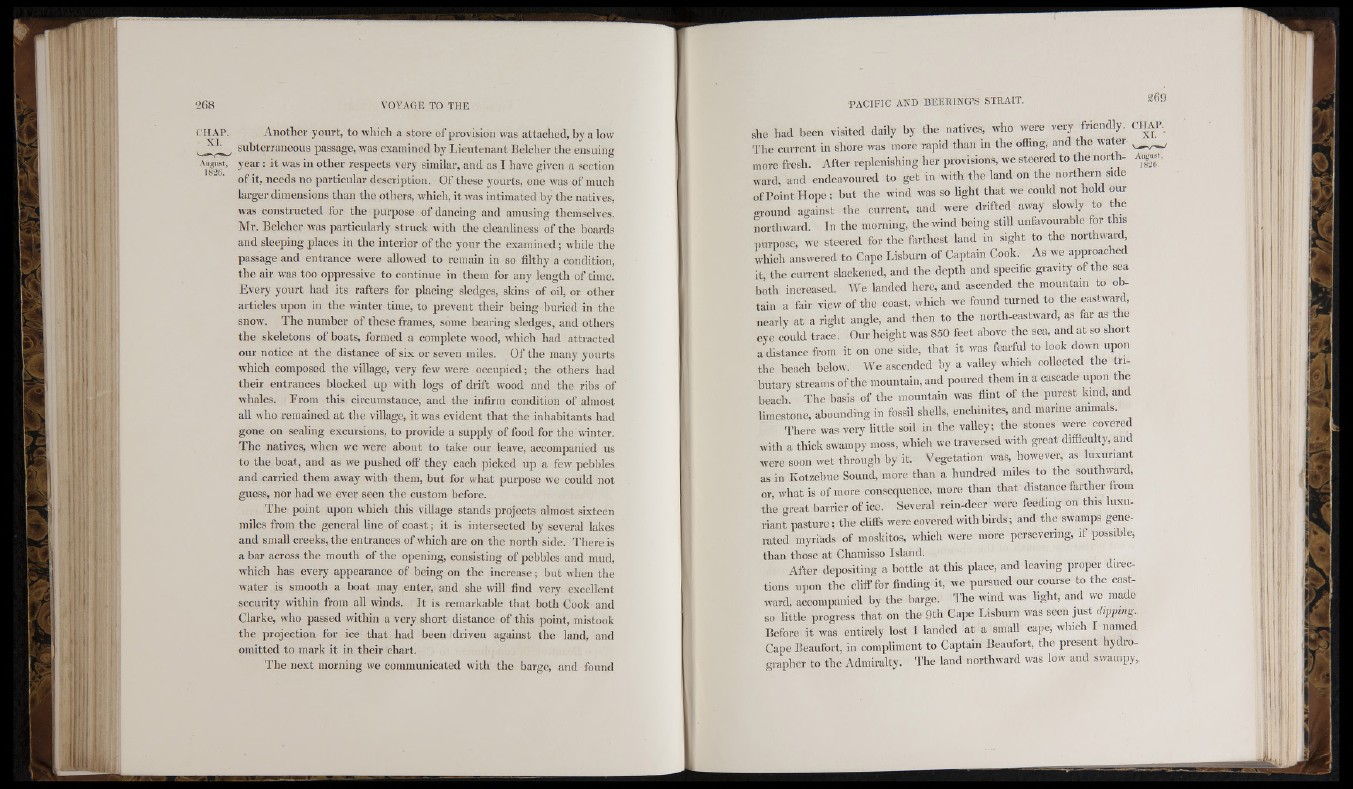
Another yourt, to which a store of provision was attached, by a loiv
subterraneous passage, was examined by Lieutenant Belcher the ensuing
year: it was in other respects very similar, and as I have given a section
of it, needs no particular description. Of these yourts, one was of much
larger dimensions than the others, which, it was intimated by the natives,
was constructed for the purpose of dancing and amusing themselves.
Mr. Belcher was particularly struck with the cleanliness of the boards
and sleeping places in the interior of the your the examined; while the
passage and entrance were allowed to remain in so filthy a condition,
the air was too oppressive to continue in them for any length of time.
Every yourt had its rafters for placing sledges, skins of oil, or other
articles upon in the winter time, to prevent their being buried in the
snow. The number of these frames, some bearing sledges, and others
the skeletons of boats, formed a complete wood, which had attracted
our notice at the distance of six or seven miles. Of the many yourts
which composed the village, very few were occupied; the others had
their entrances blocked up with logs of drift wood and the ribs of
W'hales. From this circumstance, and the infirm condition of almost
all who remained at the village, it was evident that the inhabitants had
gone on sealing excursions, to provide a supply of food for the winter.
The natives, when we were about to take our leave, accompanied us
to the boat, and as we pushed off they each picked up a few' pebbles
and carried them away with them, but for what purpose we could not
guess, nor had we ever seen the custom before.
The point upon which this village stands projects almost sixteen
miles from the general line of coast; it is intersected by several lakes
and small creeks, the entrances of which are on the north side. There is
a bar across the mouth of the opening, consisting of pebbles and mud,
W'hich has every appearance of being on the increase; but when the
water is smooth a boat may enter, and she will find very excellent
security within from all winds. It is remarkable that both Cook and
Clarke, who passed within a very short distance of this point, mistook
the projection for ice that had been driven against the land, and
omitted to mark it in their chart.
The next morning we communicated with tlie barge, and found
she had been visited daily by the natives, who were very friendly.
The current in shore was more rapid than in the offing, and the water
more fresh. After replenishing her jirovisions, we steered to the northward,
and endeavoured to get in with the land on the northern side
of Point Hope; but the wind was so light that we could not hold our
<n.ouiid against the current, and were drifted away slowly to the
northward. In the morning, the wind being still unfavourable for this
purpose, we steered for the farthest land in sight to the northward,
which answered to Cape Lisburn of Captain Cook. As we approached
it the current slackened, and the depth and specific gravity of the sea
bk h increased. We landed here, and ascended the mountain to obtain
a fair view of the coast, which we found turned to the eastward,
nearly at a right angle, and then to the north-eastward, as far as the
eye could trace. Our height was 850 feet above the sea, and at so short
a distance from it on one side, that it was fearful to look down upon
the beach below. We ascended by a valley which collected the tributary
streams of the mountain, and poured them in a cascade upon the
beach The basis of the mountain was flint of the purest kind, and
limestone, abounding in fossil shells, enchiiiites, and marine animals.
There was very little soil in the valley; the stones were covered
with a thick swampy moss, which we traversed with great difficulty, and
were soon wet through by it. Vegetation was, however, as luxuriant
as in Kotzebue Sound, more than a hundred miles to the southward,
or, what is of more consequence, more than that distance farther from
the oTeat barrier of ice. Several rein-deer were feeding on this luxuriant
pasture ; the cliffs were covered with birds; and the swamps generated
myriads of moskitos, which were more persevering, if possible,
than those at Chamisso Island.
After depositing a bottle at this place, and leaving proper directions
upon the cliff for finding it, we pursued our course to the eastward,
accompanied by the barge. The wind was light, and we made
so little progress that on the 9th Cape Lisburn was seen just dipping.
Before it was entirely lost I landed at a small cape, which I named
Cape Beaufort, in compliment to Captain Beaufort, the present hydro-
graphcr to the Admiralty. The land northward was low and swampy,
il